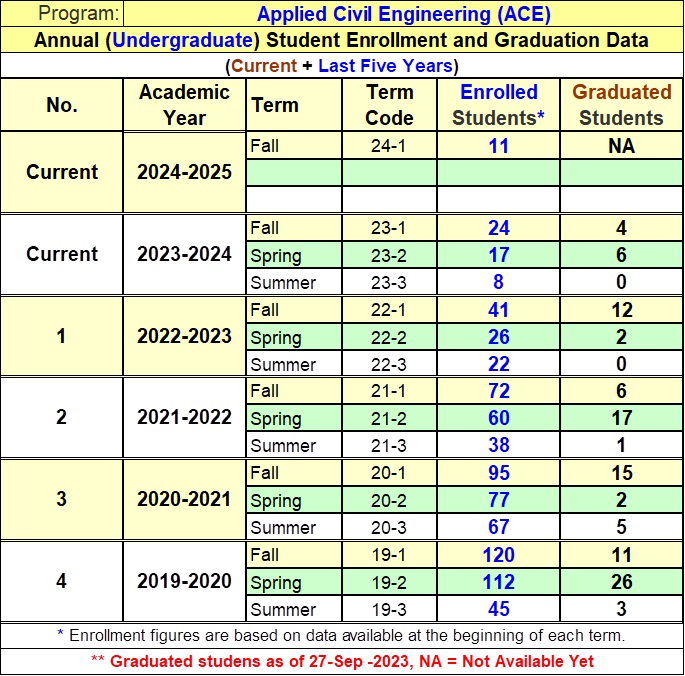
The undergraduate program "Bachelor of Science in Applied Civil Engineering (ACE) Program" is accredited by the Engineering Accreditation Commission of ABET, http://www.abet.org.
APPLIED CIVIL ENGINEERING, BS
Accredited :
Accredited Location : Main Campus
Date of Next Comprehensive Review : 2021-2022
Accredited By : Engineering Accreditation Commission
Criteria : Applied Civil Engineering
Program Educational Objectives
To prepare graduates who will have potential affinities to:
- Establish themselves as leading practicing civil engineering professionals, and demonstrate distinct abilities as responsible members of professional multi-disciplinary teams;
- Pursue career developmental activities for up-to-date professionally-technical knowledge and skills; and
- Conduct impactful basic and applied research activities to develop efficient solutions for standing and/or emerging challenges.
Student Outcomes
In order to achieve the stated program’s educational objectives, the department has put in place a responsive curriculum with a set of measurable outcomes to ascertain the expectation that our graduates acquire the desired level of skills and knowledge that would enable them to function as competent civil engineers. The seven student outcomes, which are identical to the ABET outcomes, (1) through (7), are as follows:
- An ability to identify, formulate, and solve complex engineering problems by applying principles of engineering, science, and mathematics.
- An ability to apply engineering design to produce solutions that meet specified needs with consideration of public health, safety, and welfare, as well as global, cultural, social, environmental, and economic factors.
- An ability to communicate effectively with a range of audiences.
- An ability to recognize ethical and professional responsibilities in engineering situations and make informed judgments, which must consider the impact of engineering solutions in global, economic, environmental, and societal contexts.
- An ability to function effectively on a team whose members together provide leadership, create a collaborative and inclusive environment, establish goals, plan tasks, and meet objectives.
- An ability to develop and conduct appropriate experimentation, analyze and interpret data, and use engineering judgment to draw conclusions.
- An ability to acquire and apply new knowledge as needed, using appropriate learning strategies.
Annual Student Enrollment and Graduation Data
